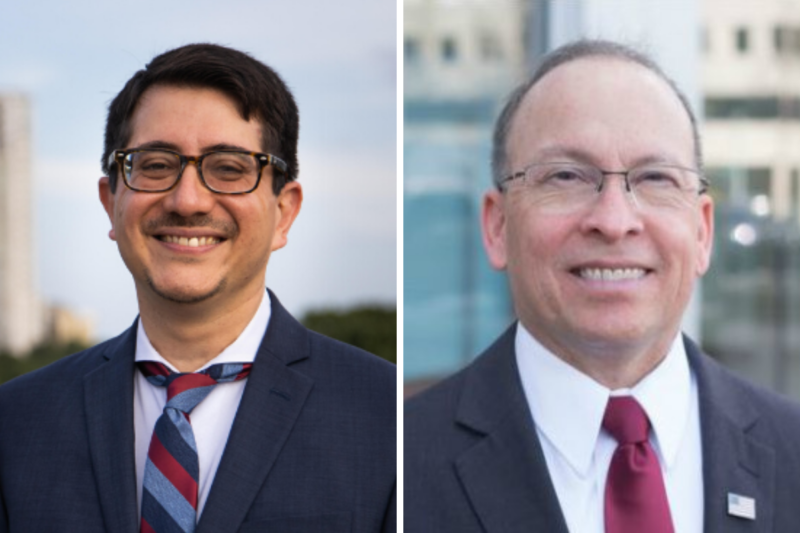Two candidates for Travis County District Attorney, José Garza and Martin Harry, are facing off not long after Austin’s streets were filled with demonstrators protesting police shootings and demanding criminal justice reform.
Garza capitalized on that context to win a Democratic primary runoff against incumbent Margaret Moore in July, promising to change the way Travis County handles drug prosecutions, bail, and investigations into officer-involved shootings.
He won the primary runoff decisively with 68% of the votes. Now the only remaining hurdle between him and the district attorney’s office is Republican Martin Harry.
If he wins, Garza will have oversight of prosecutions of the most serious crimes in Austin, including felony charges like drug dealing. (Misdemeanor cases are handled by a different office, the County Attorney).
Garza is a former immigration attorney and current co-executive director of the Workers Defense Project. He is a member of the Austin chapter of the Democratic Socialists of America, according to an interview that he gave with Jacobin magazine.
His opponent, Martin Harry, is a private attorney and former U.S. Navy judge advocate who is running a law-and-order campaign focusing on the “core functions” of the DA’s office: prosecuting criminals, deterring crime, and protecting victims’ interest.
At a Central Texas Candidate Forum on September 12, Harry said the main difference between him and his opponent is that Garza is more concerned about those who commit crimes, whereas he is more concerned about the victims of crimes. He describes Garza as having an “anti-law enforcement platform.”
Here’s a summary of the defining issues in the election for Travis County District Attorney:
Cash Bail
Garza advocates an end to the cash bail system and instead allowing nonviolent offenders out on personal recognizance bond. On his campaign website, he states, “The social costs of cash bail… are devastating for people who simply don’t have big enough wallets to buy their way out.” He says a high percentage of the jail population at any given time have not been convicted of a crime.
Martin Harry objects to Garza’s stance on bail. Without cash bail, he says, “the State will be forced to release all offenders, regardless of risk.” However, Harry also acknowledges that poor offenders are at greater risk of being confined even if their risk of flight is lower. He lists six reforms he supports regarding bail, including “an objective pretrial assessment to measure risk of flight and harm if released,” a transparent decision-making process, and an expedited appeals process when release is denied.
Drug Crimes
José Garza has not been shy about his plan to stop prosecuting drug offenses. He advocates for treating drug use as a public health issue rather than a criminal justice issue. His platform states that unless there is evidence that a person poses a danger to the public, he will not “prosecute sale or possession of a gram or less of narcotics.”
For cases involving larger quantities of narcotics, Garza will “consider all appropriate diversion programs so that person may avoid a conviction if they are not a danger to the community,” according to his campaign platform.
Martin Harry vows to enforce all laws fairly and uniformly, stating that “a DA that ignores the law or violations of the law erodes public respect for both.” His campaign emphasizes that lawmaking should stay in the hands of legislators, with enforcement being the role of the District Attorney.
Like his opponent, Harry aims to “reduce victimization of our most vulnerable residents” through crime prevention, but he believes the justice system and diversion programs work best together, with the criminal side working as leverage for diversion programs.
Defunding the Police and Police Shootings
Harry has been outspoken about Austin City Council’s recent decision to cut millions of dollars from the Austin Police Department budget, calling it “irresponsible, reckless and dangerous.” According to a press release, Harry considers the cuts to be ideologically motivated, not evidence-based, and he accuses the City Council of sacrificing public safety for a political agenda.
He connects this to the District Attorney’s race by pointing to cities where police arrest citizens participating in rioting and looting but where they are then released by prosecutors who refuse to prosecute.
In a Central Texas Candidate Forum on September 12, he stated, “It doesn’t matter how well we fund police, it also matters whether we have district attorneys willing to enforce the law.”
Both candidates advocate for more urgency and transparency when it comes to officer misconduct. Garza’s website lists seven things he plans to do regarding police misconduct, including never taking donations from police organizations, making quick decisions about officer-involved cases, and creating a “do not call” list for officers who have engaged in misconduct.
Garza vows to bring every case where there is an allegation of excessive force to a grand jury within 30 days. He also plans to appoint a police misconduct task force to review cases that are not indicted or where there is an acquittal at trial.
Harry states that he will refer cases to a grand jury when there is probable cause of criminal conduct. He points out that the grand jury process is secret, which may cause more distrust by the community if an officer ends up not being indicted.
Harry also emphasizes the need to work cooperatively with law enforcement and expressed concern over Garza’s adversarial approach.
